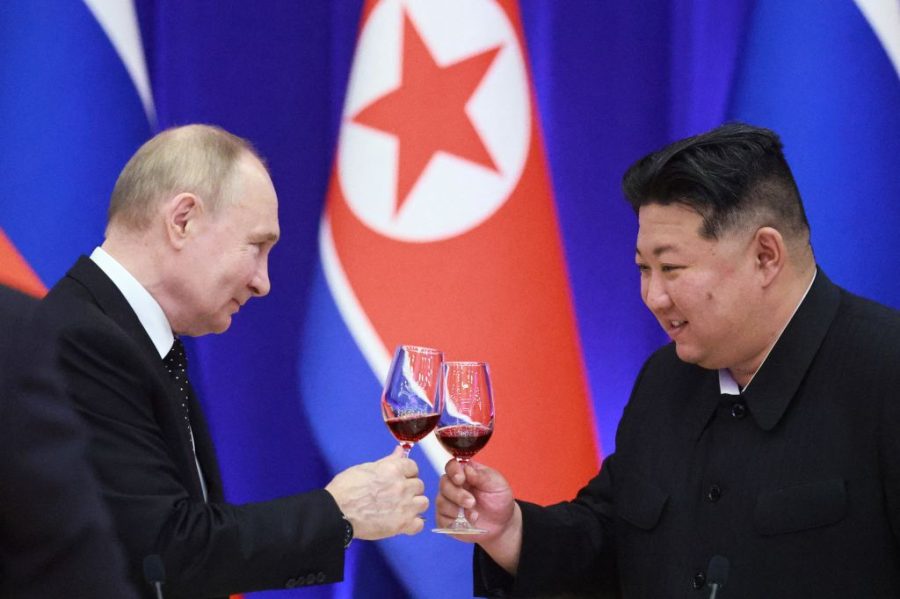We knew it was happening all along, but it was only a matter of time before both Russia and North Korea confirmed to the world the inevitable fact that their relationship is more than rhetoric. Six months after the first North Korean soldiers were deployed to the Kursk region, the Kim regime has finally admitted that the country’s armed forces have ‘participated in the operations for liberating’ the area, in what marked ‘a new chapter of history’ in relation to the ‘firm militant friendship between the two countries of the DPRK and Russia’. Only days earlier, the Chief of the General Staff of the Russian armed forces, Valery Gerasimov, lauded the ‘heroism and fortitude’ of the North Korean troops.
Russia and North Korea have long been reluctant to tell the world that it was not just North Korean artillery and missiles, but also manpower, being sent in Moscow’s direction from its Cold War client state, despite clear evidence to the contrary. Following an initial deployment of approximately 11,000 North Korean soldiers in the autumn of last year – the majority of whom were from the country’s élite special forces – at least an additional 2,000 were sent in January this year.
Will either side now be willing to admit just what Russia has been providing North Korea in return?
This marked the first time that North Korean forces have been involved in any global conflict since the Korean War. In early January 2025, reports from Kyiv deemed more than 3,000 North Korean soldiers to have been killed or injured in the war. Given the high death and casualty numbers, it is no surprise that the Kim regime decided to replenish Putin’s supplies.
This week’s announcement marks the culmination of months of the two sides refusing to admit the reality of their arrangement. After North Korean soldiers were captured and killed by Ukraine at the end of last year, Kyiv’s forces subsequently found handwritten notes conveying supportive messages from Kim Jong Un near the bodies of the dead North Korean soldiers. What’s more, in early February this year, as reports emerged of Pyongyang’s troops being withdrawn from the front line in the Kursk region and forced to regroup, the North Korean leader called on the nation to boost ‘military readiness’ to ‘respond to any volatile security situation’.
In addition to praising its troops ‘for performing heroic feats’ in the Kursk region, North Korean state media earlier today stressed how the involvement of its troops conformed ‘to all the provisions and the spirit of the UN Charter and other international laws’. Much akin to how Pyongyang seeks to justify its nuclear development, North Korea once again sought to legitimise its rule-breaking actions by appealing to international law and the United Nations, two institutions for which it has shown nothing but utter contempt. This is a regime whose very existence has been premised around lying and deception.
Moscow and Pyongyang’s recent revelation underscores how this relationship is not going anywhere anytime soon. After all, when Kim Jong Un deemed it a ‘sacred mission’ to consolidate the ‘friendship and solidarity’ between North Korea and Russia, which he deemed to be ‘as firm as a rock’, he was not mincing his words.
The real question, however, remains whether either side will now be willing to admit just what Russia has been providing North Korea in return for its munitions and soldiers. Kim Jong Un’s quest to modernise North Korea’s conventional and unconventional weapons arsenal is well-known. Last month, Kim witnessed a test of new suicide drones, likely equipped with artificial intelligence technology. Russian cooperation in procuring and developing such technology cannot be ruled out. In another example, only on Saturday, North Korean state media proudly displayed Kim Jong Un and his daughter, Kim Ju-ae, attending the launch of a new, 5,000-ton naval destroyer warship which, Kim claimed, could be armed with powerful weapons systems, including nuclear-capable ballistic missiles.
Earlier today, North Korean state media praised its troops for ‘performing heroic feats in the operations to repulse and annihilate the grave sovereignty infringement by the Ukrainian authorities’, in what Pyongyang termed a ‘victory of justice against injustice’. But the conflict is not over yet.
The Ukraine war has demonstrated the intertwined nature of the Euro-Atlantic and Indo-Pacific theatres. With North Korea now acknowledging its active involvement in the war, one question is now how long China – North Korea’s main economic benefactor – can sit idly by. Beijing’s avoidance of discussing the matter in public has certainly been no accident. China is likely to continue to sit back and assist Russia’s war through sending dual-use technologies and hosting Russian weapons factories, all the while hoping that its precarious relations with the West will not decline any further.
As the Trump administration’s efforts for ‘peace talks’ to end the Ukraine War wax and wane, we will have to wait and see with respect to any revival of the infamous talks between Trump and Kim. In 2018, the year when the two leaders met for the first time in Singapore, the then-South Korean president, the Catholic Moon Jae-in, told the late Pope Francis of Kim Jong Un’s willingness to meet the Pontiff. In 2022, the Vatican reminded the North that Francis was eager to make the trip in pursuit of peace. By then, however, it was too late. With North Korea now making official its renewed relations with Russia, Kim Jong Un could plausibly ask for Trump to wait before he comes to any negotiating table.
The prospect of more North Korean troops being sent to the Kursk region and beyond cannot be ruled out. For us in Britain, the North Korean threat cannot be ignored. A new chapter in international relations is indeed underway, far from the so-called rules-based international order that has existed since the end of the second world war. However transactional the cooperation between Russia, North Korea, China, and Iran, it is time to recognise the threat our values and interests face.







Comments